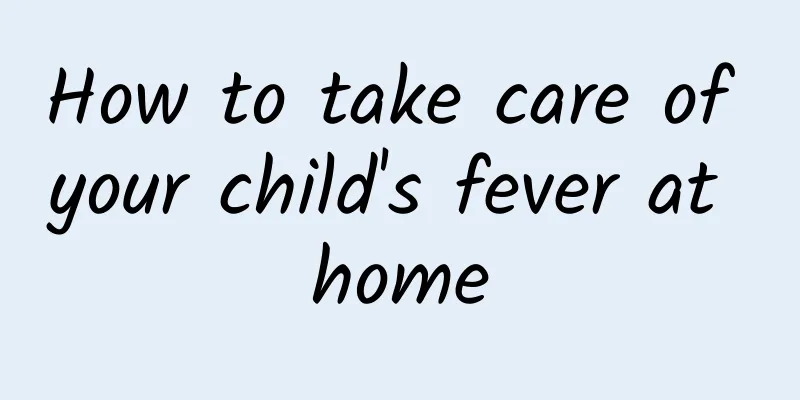How to take care of your child's fever at home

|
If the child's temperature exceeds 38.2℃, parents need to give the child antipyretics in time. The specific medication plan needs to be used under the guidance of a doctor. You can refer to "Which medicines can be chosen when a child has a fever". However, parents should pay attention to avoid the following misunderstandings when caring for their children. 1. Children should not be dressed in thick clothes or covered with thick blankets: Children will sweat a lot during fever, which is a natural process of the body's self-regulation and heat dissipation. If the child is covered with too thick bedding or wrapped too much, it will hinder the effective dissipation of heat and may even aggravate the fever symptoms. Therefore, it is recommended that the bedding chosen for the child should be as light as possible. 2. Be careful about repeated medication: Acetaminophen and ibuprofen are commonly used antipyretic and analgesic drugs for children with fever. Some parents may mistakenly believe that using the two drugs together can improve the antipyretic effect. In fact, ibuprofen and acetaminophen have similar antipyretic effects. If the two are used at the same time, it is very likely to cause the body temperature to drop too quickly, and the side effects of the drugs will overlap, which may cause nausea, vomiting and other discomfort symptoms, and in severe cases, even damage to the liver and kidneys of children. 3. Do not mistake the antipyretic patch for antipyretic medicine: The antipyretic patch is a commonly used physical cooling product, the main component of which is gel. This product achieves a cooling effect by absorbing and taking away the body's surface heat through the vaporization process of the water in the gel, but it cannot really lower the body temperature. It is only a symptomatic treatment and has no therapeutic effect on the root cause of the fever. If the child's body temperature exceeds 38.2℃, it is usually difficult to achieve significant results using a antipyretic patch. At this time, you should take antipyretic and analgesic drugs as soon as possible or seek professional diagnosis and treatment from a doctor. 4. Avoid eating too much meat and fish: When a child has a fever, their digestive function weakens, so they should be given a light diet, such as porridge, soft noodles, etc. Try to eat small meals frequently. Do not eat greasy foods such as eggs, pork rib soup, chicken soup, etc. These foods contain a lot of fat, and eating them will increase the burden on the digestive tract of children. Not only is it not conducive to the recovery of the disease, but it may also cause diarrhea. What needs to be emphasized to parents is that home care for children with fever requires comprehensive consideration of multiple aspects, including observation and measurement of body temperature, medication to reduce fever, and precautions. Only by doing these tasks comprehensively and carefully can we help children better cope with the discomfort caused by fever. (Zhang Xiufeng, Inner Mongolia Autonomous Region Maternal and Child Health Hospital) |
<<: Why is juniper pollen so popular? The scientific truth behind the "smoking" of the top streamers
Recommend
Can fermented rice dumplings enlarge breasts?
Fermented glutinous rice balls are actually a com...
Abnormal leucorrhea and amenorrhea
Menstruation is a physiological phenomenon unique...
Is bleeding in early pregnancy a boy?
Bleeding in early pregnancy needs to be taken ser...
Can I still get pregnant after having my period twice?
Some friends often have this situation, with two ...
Why do women have heel pain?
For women, wearing high heels is an effective way...
Do's and Don'ts in the First Three Months of Pregnancy
Pregnancy is a special period, especially the fir...
Why can't girls hold their urine?
I wonder if girls have ever encountered the probl...
Does pregnancy have any effect on adnexitis?
Having a gynecological disease will bring about g...
Is it normal for a pregnant woman to have a cold belly?
Women are particularly prone to certain symptoms ...
Can I still grow taller when I have my period?
I believe that every girl has an expectation for ...
What should girls do if their menstrual period is long?
Seven days a month is already an unbearable limit...
What is the cause of a headache caused by frequent dreams? How to treat a headache caused by frequent dreams
Many friends always have headaches, and they all ...
Can pregnant women take cephalexin for anti-inflammatory treatment?
Cefixime is an antibiotic. When pregnant women ha...
Is breast cancer negative or positive?
At present, there are still many women suffering ...
What causes cervical insufficiency?
Women's cervix may have many abnormal problem...









